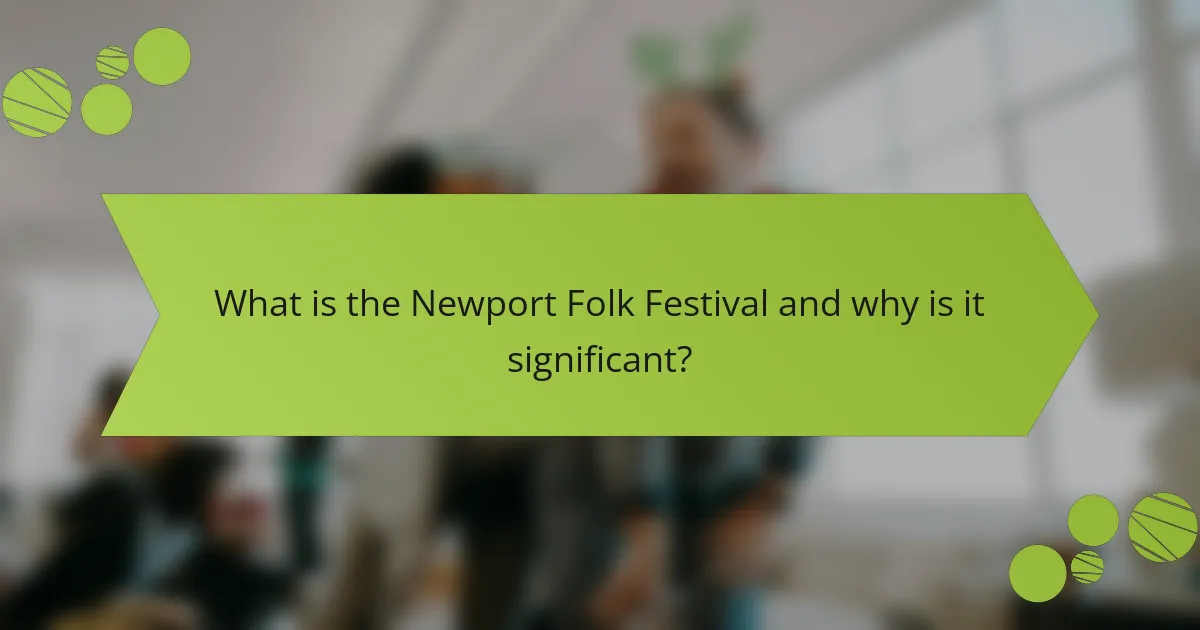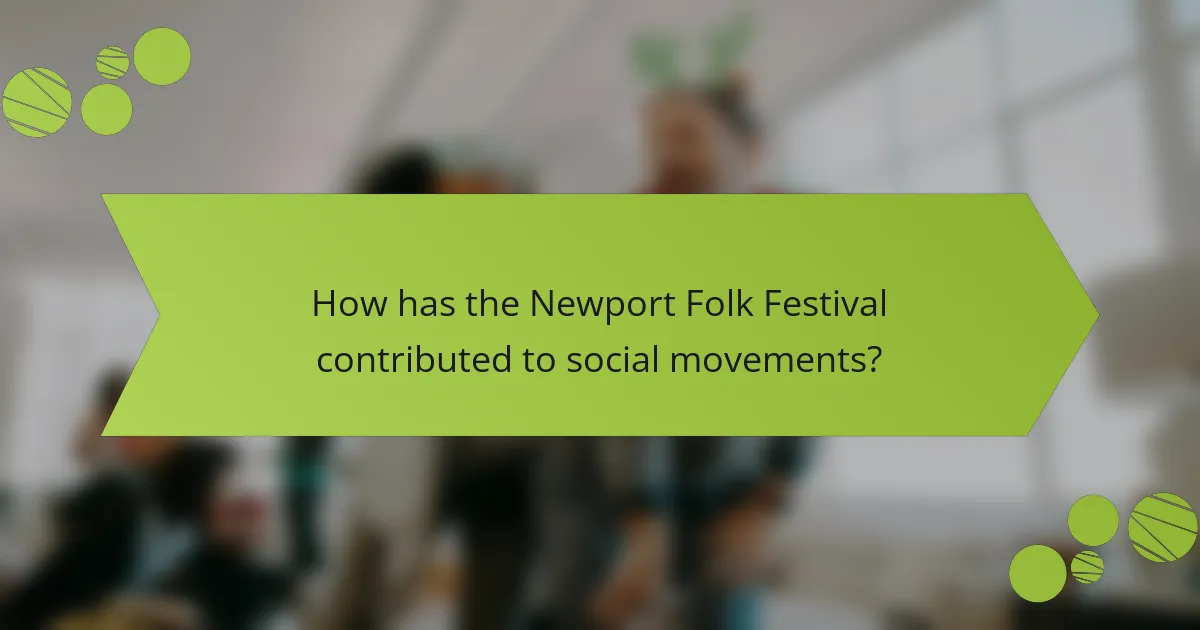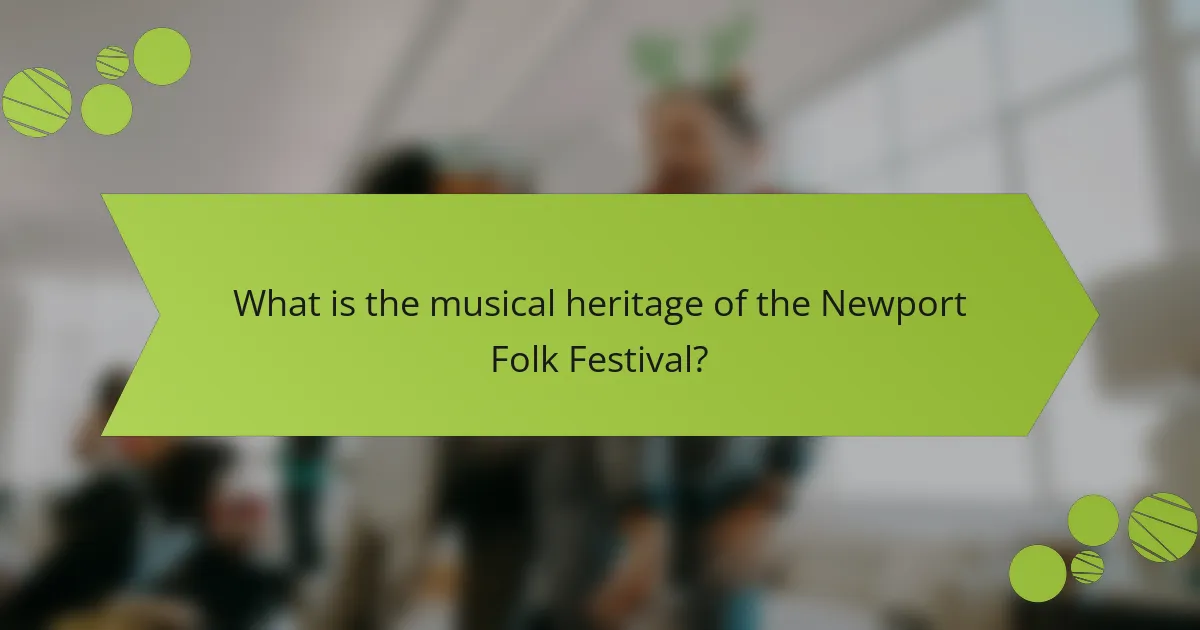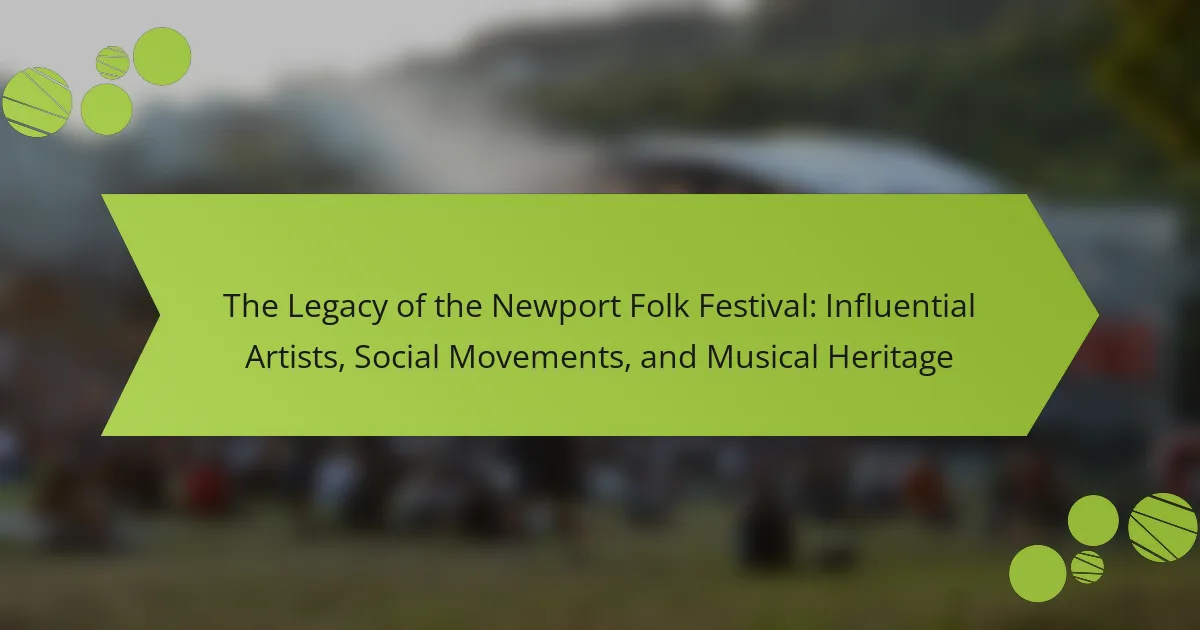The Newport Folk Festival is an annual music festival held in Newport, Rhode Island, focusing on folk music and its subgenres. Established in 1954, the festival has become a significant cultural event, known for its influential performances and its role in promoting social movements such as civil rights and anti-war efforts. Notable artists associated with the festival include Bob Dylan, Joan Baez, and Pete Seeger, who have used their music to advocate for social change. The festival continues to honor its musical heritage while fostering community and inclusivity, making it a vital platform for both emerging and established musicians.

What is the Newport Folk Festival and why is it significant?
The Newport Folk Festival is an annual music festival held in Newport, Rhode Island. It focuses on folk music and its various subgenres. Established in 1954, it has become a significant cultural event. The festival is known for its role in launching and revitalizing the careers of many influential artists. Notable performances include Bob Dylan’s iconic 1965 electric set, which marked a pivotal moment in music history. The festival also serves as a platform for social movements, promoting messages of peace and equality. Its legacy includes fostering a sense of community among artists and fans alike. The Newport Folk Festival continues to be a vital part of American musical heritage.
How did the Newport Folk Festival originate?
The Newport Folk Festival originated in 1959. Founded by George Wein, it aimed to celebrate folk music and culture. The festival took place in Newport, Rhode Island. It featured a diverse lineup of artists, including established and emerging talents. The event quickly became a significant platform for folk music. It played a pivotal role in the folk revival of the 1960s. The festival also embraced social movements, reflecting the cultural changes of the time. Artists like Bob Dylan and Joan Baez were integral to its history.
What were the cultural and social contexts of its inception?
The Newport Folk Festival originated in the early 1960s amid significant cultural and social upheaval in the United States. The civil rights movement was gaining momentum, influencing artists and audiences alike. Folk music served as a vehicle for social commentary and activism during this period. The festival provided a platform for voices advocating for change. Artists like Bob Dylan and Joan Baez became symbols of this movement. The convergence of music and social issues attracted diverse audiences. This context fostered a sense of community and shared purpose among attendees. The festival’s inception was a response to the desire for artistic expression linked to social justice.
Who were the founders and key figures in its early years?
The Newport Folk Festival was founded by George Wein in 1954. George Wein was a jazz promoter and music festival pioneer. He envisioned a festival that celebrated folk music and its cultural significance. Other key figures included Pete Seeger, who was instrumental in shaping the festival’s direction. Joan Baez also played a significant role in its early years, bringing attention to social issues through her music. These individuals contributed to the festival’s legacy and its impact on the folk music scene. Their involvement helped establish the Newport Folk Festival as a platform for social movements and artistic expression.
What role has the Newport Folk Festival played in music history?
The Newport Folk Festival has significantly shaped music history by introducing and promoting folk music and social activism. Established in 1959, it became a platform for influential artists such as Bob Dylan and Joan Baez. The festival is known for its role in the folk revival movement of the 1960s. It provided a space for political expression through music, aligning with civil rights and anti-war movements. The 1965 performance by Bob Dylan, where he went electric, marked a pivotal moment in music history. This event challenged traditional folk music norms and influenced future genres. The festival continues to celebrate diverse musical styles and cultural narratives, reinforcing its legacy in American music.
Which genres have been prominently featured at the festival?
Folk, blues, rock, and country genres have been prominently featured at the Newport Folk Festival. The festival has a rich history of showcasing folk music since its inception in 1959. It has served as a platform for both established and emerging artists across these genres. Notable performances include Bob Dylan’s iconic electric set in 1965, which marked a pivotal moment in rock music. The festival continues to embrace diverse musical styles while maintaining its folk roots. This commitment to genre variety has helped the festival remain relevant over the decades.
How has the festival influenced the careers of emerging artists?
The festival has significantly influenced the careers of emerging artists by providing them with a prominent platform. Many artists gain exposure to industry professionals and a wider audience through performances at the festival. For instance, artists like Joan Baez and Bob Dylan launched their careers after showcasing their talent at Newport. The festival also fosters networking opportunities, connecting emerging artists with established musicians. Additionally, the festival’s commitment to diverse genres encourages artists to explore and innovate. This supportive environment helps artists develop their unique sound and artistic identity. Overall, the Newport Folk Festival serves as a crucial stepping stone for many aspiring musicians.
What are some of the most influential performances at the Newport Folk Festival?
Some of the most influential performances at the Newport Folk Festival include Bob Dylan’s 1965 electric set. This performance marked a significant shift in folk music and popular culture. It sparked controversy and debate over the direction of folk music. Another notable performance was Joan Baez’s early appearances, which helped to elevate the folk revival movement. Baez’s activism and music inspired many during the civil rights era. Additionally, Peter, Paul and Mary brought folk music to mainstream audiences. Their performance of “Blowin’ in the Wind” became an anthem for social change. These performances collectively shaped the festival’s legacy and influenced generations of musicians.
Which iconic artists have graced the stage and what impact did their performances have?
Iconic artists such as Bob Dylan, Joan Baez, and Johnny Cash have graced the stage at the Newport Folk Festival. Bob Dylan’s 1965 electric performance marked a pivotal moment in folk music, signaling a shift towards rock influences. Joan Baez’s activism and powerful voice brought attention to social justice issues, inspiring generations. Johnny Cash’s performances connected with audiences through themes of hardship and redemption. Each artist’s presence contributed to the festival’s reputation as a platform for artistic expression and social change. Their performances have had lasting impacts on music and culture, shaping the landscape of American folk and protest music.
How did specific performances reflect or shape social movements?
Specific performances at the Newport Folk Festival reflected and shaped social movements by using music as a platform for activism. Artists like Joan Baez and Bob Dylan used their performances to address civil rights and anti-war sentiments. Baez’s rendition of “We Shall Overcome” in 1963 became an anthem for the civil rights movement. Dylan’s “Blowin’ in the Wind” posed poignant questions about peace and justice, resonating with anti-war activists. These performances galvanized audiences and spread awareness of social issues. The festival itself became a gathering place for like-minded individuals advocating for change. Historical context shows that the Newport Folk Festival was pivotal in merging music with social activism during the 1960s.

How has the Newport Folk Festival contributed to social movements?
The Newport Folk Festival has significantly contributed to social movements by providing a platform for artists advocating for change. Since its inception in 1959, the festival has featured musicians who addressed civil rights, anti-war sentiments, and social justice. Notable performances include Bob Dylan’s 1965 electric set, which symbolized a shift in the folk movement towards broader social issues. The festival has consistently highlighted artists like Joan Baez and Pete Seeger, who used their music to promote activism. In 2019, the festival celebrated its 60th anniversary with a focus on inclusivity and representation in music. This commitment to social causes has made the Newport Folk Festival a vital part of the cultural landscape, influencing public discourse and inspiring generations of activists.
What social issues have been highlighted at the festival?
The Newport Folk Festival has highlighted several social issues over the years. Key issues include civil rights, environmental sustainability, and social justice. The festival has served as a platform for artists to address these topics through their performances. For instance, during the 1960s, many artists used the stage to promote civil rights. Notable performances included those that supported racial equality and anti-war sentiments. More recently, the festival has focused on climate change and its impact on communities. Artists have raised awareness about the importance of environmental activism. These themes reflect the festival’s commitment to social change and community engagement.
How has the festival served as a platform for activism?
The Newport Folk Festival has served as a platform for activism by promoting social justice and political awareness through music. Artists at the festival have historically used their performances to address issues like civil rights and environmental concerns. For instance, in the 1960s, Bob Dylan’s performance became emblematic of the civil rights movement. The festival has also featured artists advocating for causes such as [censured] rights and climate action. Its collaborative spirit encourages musicians to unite for social change. The festival’s commitment to inclusivity fosters a space for marginalized voices. This activism is evident in the festival’s partnerships with various social organizations. Overall, the Newport Folk Festival has consistently leveraged its influence to inspire activism and social change.
What notable collaborations have emerged from the festival’s social initiatives?
Notable collaborations from the festival’s social initiatives include partnerships with various social justice organizations. These collaborations have focused on issues such as racial equality and environmental sustainability. For instance, the Newport Folk Festival has worked with organizations like the Southern Poverty Law Center. This partnership aimed to promote awareness and support for civil rights initiatives. Additionally, the festival has collaborated with local charities to provide resources for underserved communities. These efforts have strengthened the festival’s commitment to social change and community engagement.
How have artists used the Newport Folk Festival to advocate for change?
Artists have used the Newport Folk Festival to advocate for change by leveraging their platform to promote social justice and activism. The festival has historically featured performances that address civil rights, environmental issues, and political movements. For example, in 1963, Joan Baez performed at the festival, using her music to bring attention to civil rights activism. Additionally, artists like Bob Dylan have incorporated messages of protest into their performances, influencing public opinion and inspiring action. The festival continues to serve as a venue where artists can engage audiences on pressing social issues, making music a powerful tool for advocacy.
Which artists have been most vocal about social issues during their performances?
Artists such as Bob Dylan, Joan Baez, and Bruce Springsteen have been most vocal about social issues during their performances. Bob Dylan famously used his platform to address civil rights and anti-war sentiments in the 1960s. Joan Baez, a prominent folk singer, has consistently advocated for peace and social justice through her music and speeches. Bruce Springsteen often highlights themes of economic inequality and workers’ rights in his songs and live shows. These artists have made significant impacts by intertwining their music with activism, thus raising awareness on various social issues.
What messages have been conveyed through their music at the festival?
The messages conveyed through music at the Newport Folk Festival often focus on social justice, unity, and cultural heritage. Artists use their platforms to address pressing social issues. For instance, songs about civil rights and anti-war sentiments have been prominent. Pete Seeger and Joan Baez have historically emphasized peace and activism in their performances. The festival has served as a space for voices advocating for change. Many artists share personal stories that resonate with broader societal themes. This tradition has continued, reflecting ongoing struggles and triumphs. The festival’s music fosters community and collective action among attendees.

What is the musical heritage of the Newport Folk Festival?
The musical heritage of the Newport Folk Festival is rooted in American folk music traditions. Established in 1959, the festival has showcased influential artists like Bob Dylan and Joan Baez. It played a significant role in the folk revival of the 1960s. The festival emphasizes genres such as folk, blues, and country. It has also promoted social movements, particularly civil rights and anti-war efforts. The event has evolved to include contemporary artists while honoring its historical roots. Its legacy includes fostering community and cultural exchange among diverse musical styles. The Newport Folk Festival remains a pivotal platform for emerging talent and established musicians alike.
How has the festival evolved over the decades?
The Newport Folk Festival has significantly evolved since its inception in 1959. Initially, it focused primarily on traditional folk music and featured artists like Joan Baez and Pete Seeger. Over the decades, the festival expanded its musical scope to include various genres such as rock, blues, and indie. In the 1960s, it became a platform for social movements, highlighting civil rights and anti-war sentiments through music. By the 2000s, the festival embraced contemporary artists, blending new sounds with its folk roots. The introduction of innovative formats, like collaborations and surprise performances, has kept the festival fresh and relevant. Today, it attracts a diverse audience, showcasing both established and emerging talent. This evolution reflects broader changes in music and culture, maintaining the festival’s status as a vital part of American music history.
What changes in musical styles and themes have been observed?
Changes in musical styles and themes have evolved significantly over the decades. The Newport Folk Festival has been a catalyst for these transformations. Initially, the festival showcased traditional folk music, emphasizing acoustic instruments and storytelling. As the festival progressed, it began incorporating elements from rock, blues, and pop. This shift reflected broader cultural movements, including the civil rights and anti-war movements. Artists like Bob Dylan introduced electric instrumentation, altering the folk genre’s sound. The festival also embraced diverse genres, featuring artists from various backgrounds. This inclusivity expanded the thematic scope to include social justice, environmental issues, and personal narratives. The evolution of musical styles at Newport mirrors societal changes, highlighting the festival’s role in shaping contemporary music.
How does the festival maintain its roots while embracing new trends?
The Newport Folk Festival maintains its roots while embracing new trends by integrating traditional folk music with contemporary genres. This approach allows the festival to honor its historical legacy while appealing to modern audiences. The festival features a diverse lineup that includes both established folk artists and emerging musicians from various genres. For instance, collaborations between classic folk musicians and modern artists showcase this blend. Additionally, the festival promotes social movements and activism, reflecting its commitment to cultural relevance. By offering workshops and discussions, it engages attendees in the evolving landscape of music and social issues. This strategy ensures the festival remains a vital platform for both heritage and innovation.
What legacy does the Newport Folk Festival leave for future generations?
The Newport Folk Festival leaves a legacy of musical innovation and cultural significance for future generations. It has been a platform for folk music since 1954, showcasing influential artists like Bob Dylan and Joan Baez. The festival played a crucial role in the folk revival movement of the 1960s. It fostered social change by supporting civil rights and anti-war movements through music. The festival’s commitment to artistic expression encourages new generations of musicians. Its diverse lineup continues to inspire creativity and collaboration across genres. The Newport Folk Festival remains a symbol of community and activism in the music world. This legacy shapes the values of future artists and audiences alike.
How does the festival influence contemporary folk music?
The festival significantly influences contemporary folk music by showcasing diverse artists and styles. It serves as a platform for emerging musicians to gain recognition. The Newport Folk Festival has a history of introducing innovative acts that shape the genre. For example, artists like Bob Dylan and Joan Baez emerged from this festival. Their performances have inspired countless contemporary folk musicians. The festival also promotes collaboration among artists, fostering creative exchanges. This collaborative spirit leads to new interpretations of traditional folk music. Additionally, the festival highlights social movements, integrating relevant themes into the music. This connection keeps folk music socially and culturally relevant today.
What lessons can be learned from its history and impact?
The history and impact of the Newport Folk Festival teach important lessons about cultural influence and social change. The festival has historically provided a platform for artists who address social issues. For example, Bob Dylan’s performance in 1965 marked a pivotal moment in music and protest culture. This event illustrated how music can unite people for a cause. Additionally, the festival has showcased diverse genres, promoting inclusivity in the arts. The involvement of various artists has highlighted the role of music in shaping societal values. Overall, the festival’s legacy demonstrates the power of art to inspire movements and foster community engagement.
How can attendees make the most of their Newport Folk Festival experience?
Attendees can make the most of their Newport Folk Festival experience by planning their schedule in advance. The festival features multiple stages with overlapping performances. Knowing the lineup and set times helps attendees prioritize must-see artists. Arriving early ensures a good spot for popular acts. Engaging with the festival community enhances the experience. Attendees can participate in workshops and discussions to deepen their understanding of folk music. Exploring local vendors offers unique food and crafts. Lastly, taking time to enjoy the scenic surroundings adds to the overall enjoyment. The Newport Folk Festival attracts thousands of music lovers, making it an immersive cultural experience.
What tips should first-time attendees consider when planning their visit?
First-time attendees should plan their visit by researching the festival schedule in advance. The Newport Folk Festival features numerous performances and events over several days. Knowing the lineup helps prioritize which artists to see. Attendees should also consider purchasing tickets early, as they often sell out quickly. Familiarizing oneself with the festival grounds is beneficial for navigation. Understanding the location of stages and amenities can enhance the experience. Additionally, attendees should prepare for varying weather conditions, as the festival occurs outdoors. Bringing appropriate clothing and essentials is crucial for comfort. Lastly, engaging with fellow attendees can enrich the experience, as the festival fosters a sense of community.
How can festival-goers engage with the community and artists effectively?
Festival-goers can engage with the community and artists effectively by participating in workshops and discussions. These activities allow attendees to interact directly with artists and learn about their creative processes. Additionally, volunteering at the festival fosters connections with both the community and performers. Engaging in social media conversations around the event enhances interaction and community involvement. Attending local events or meet-and-greets provides opportunities for personal engagement with artists. Research shows that active participation increases community cohesion and artist visibility. According to a study by the National Endowment for the Arts, festivals that encourage interaction lead to stronger community ties and greater appreciation for artistic contributions.
The Newport Folk Festival is a significant annual music event held in Newport, Rhode Island, focusing on folk music and its subgenres since its establishment in 1954. This festival has played a crucial role in launching influential artists like Bob Dylan and Joan Baez while also serving as a platform for social movements advocating for peace and equality. The article outlines the festival’s origins, its impact on music history, the diverse genres showcased, and its contributions to social activism. Additionally, it highlights notable performances and collaborations that reflect the festival’s legacy in shaping contemporary folk music and fostering community engagement.
